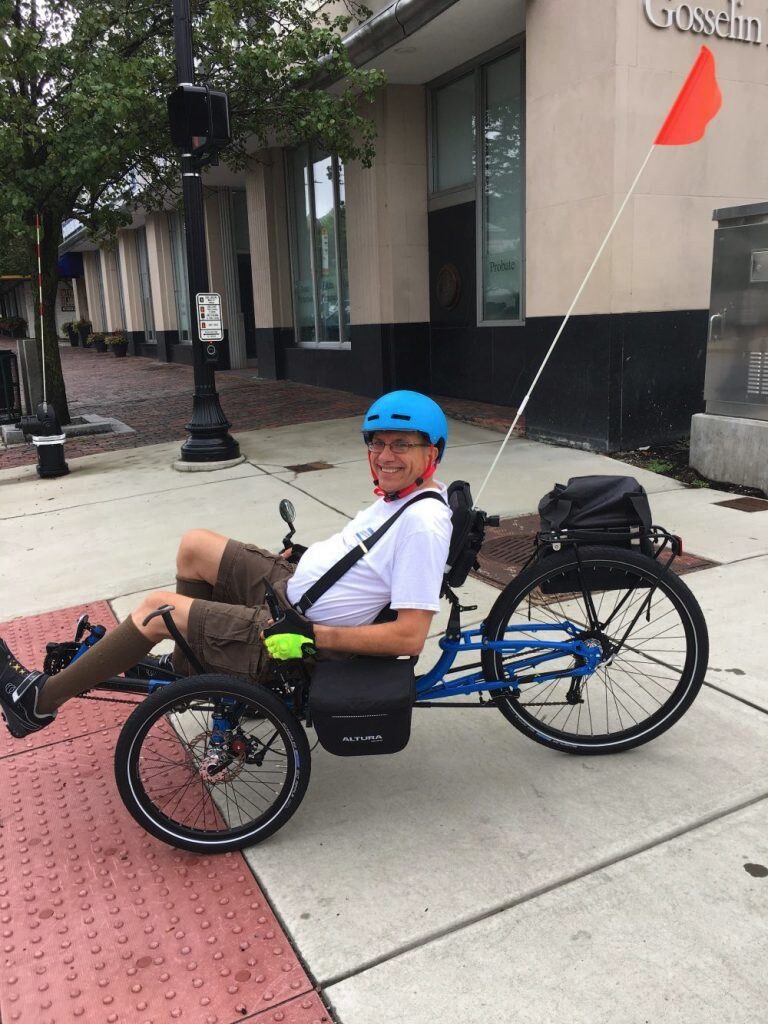
Editor’s Note: In this episode of his podcast, Danny van Leeuwen interviews himself in the guise of “Health Hats,” the moniker Danny has used for many years. Danny is always inspiring, whether interviewing others for the podcast or engaging himself in sincere reflection about what’s most important now. This episode reads like an update to the post Danny wrote for Engaging Patients in 2017. It’s wonderful to see that he is staying the course toward best health. This episode is available in audio along with other materials on Danny’s website.
Health Hats: So, Mr. Danny, you often talk and write about your health journey. What does that even mean? Where are you headed?
Danny van Leeuwen: I’m trying to operate at peak performance as much as I can – the best physical, mental, and spiritual health at any given moment, considering my conditions, circumstances, environment, and routines. I want to do what I want to do as much as possible. I call that Best Health.
Health Hats: What’s the big deal. Doesn’t everyone want Best Health – able to do what they want to do?
Danny van Leeuwen: Some people never think about where they’re headed. Yet, they’re still traveling – consciously or not, inching forward, one day after another. For me, the journey toward best health is a purposeful activity requiring periodic focus on the destination and the journey. On any journey, we have a destination. We’re going somewhere. We’re going to work. We’re going to the grocery store. We’re going to go visit our in-laws or going on vacation. We’re headed somewhere alone or with people. We’re making decisions along the way. We’re always making decisions. Do we need fuel, a break? Do we know the way? Do we make a left or a right? Do we need help with the decisions? A crony, a local, a map, a GPS, a bed for the night? Decisions. It’s the same for the health journey. The health journey is complicated. It helps to know where we’re going.
Health Hats: The health journey doesn’t seem like going to Chicago or the library. We’re all so different. Some people don’t have a car, some don’t walk so well or at all. Some don’t speak the language those around them are speaking. Some can’t get a tune out of their heads. Some have kids, parents, partners who depend on them. Some have a sprained ankle or a headache. The health journey seems so noisy and distracted. It’s not like driving your car somewhere.
Danny van Leeuwen: Well put. While the analogy isn’t perfect, it still has legs As you said, people on a journey have limitations. Everybody has limitations. I don’t walk so well. I get tired easily. But I need to have a sense of where I’m going or I’m afraid I might not get there. I won a lottery I didn’t buy a ticket for. I have a chronic progressive illness. I can’t afford to be freaked out all the time with my lot in life. I’d rather spend most of time appreciating my blessings. Knowing where I’m going makes a difference to me. A destination helps quiet the noise and increases my focus. Perhaps that focus makes me more likely to go in a satisfying direction.
Health Hats: So, where are you going on your journey toward best health?
Danny van Leeuwen: You already know me pretty well. My progressive thing is multiple sclerosis. I have strength issues, balance issues, pain, fatigue, yada yada… more than you want to know. You have issues, too, diagnosed or not. That’s life. MS is seriously annoying for me; seriously annoying, but not disabling. Not disabling because I know what I want in my life. Knowing my destination helps me steer, stop for fuel, and get there and keep symptoms manageable. When I think about my life and my abilities, I want to keep getting my 3500 steps a day, keep playing my baritone saxophone, do nothing to mess with my pathological optimism, and not hurt myself if I fall. Really, I’d rather not fall at all, but it seems inevitable. These are my personal goals, my life goals. The destinations ahead of me relate to function, spirit, mood, and safety. My care partner (my wife), my family, primary care doc, neurologist, and chiropractor know my personal and life goals. Whenever we consider a treatment plan – pharmaceutical or non-pharmaceutical, we take into consideration these personal goals – activity, music, outlook, and fall prevention.
I have symptom goals as well. Symptoms like pain. As far as pain goes, I’d prefer to have no pain, but that isn’t realistic for me. I have a love hate relationship with opioids just like I have with steroids. They’re magic for a minute, and then absolutely awful. I get depressed, unpleasant to live with, and constipated. So, my goal is to prevent or reduce my pain to the point that the pain doesn’t consume me. Consume me, means that I can’t do anything. Mostly, I try to keep pain below a threshold where I can live life – activity, music, mood, not falling – my personal goals. Staying below that threshold means have regular habits that work for me – manage my weight, daily exercise routine, chiropractic, meaningful work, socialization (I’m an extrovert), liberal use of Tylenol and Ibuprofen, heat, cold, and vibration.
Health Hats: Wow. That’s all pretty sober stuff. Do you think most people can relate to this business of personal and symptom goals?
Danny van Leeuwen: I don’t know most people. I’ve found something that works for me and I have another chronic condition: I’m a chronic sharer, wearing it all on my sleeve. That’s part of my program. Profound understanding of my body, mind, and spirit helps with perspective and reduces fear for me. Sometimes, I try to explain personal health goals to people like this. If you’re well, you want to stay well. If you’re acutely ill, you want to get over it as soon as possible. If you’re chronically ill or dying, you want to live the best life possible. Almost everyone I’ve tried to explain that to, can relate to some of it -wellness, acute illness, chronic illness, end-of-life.
Medical Goals and Personal Goals. We Are Not Our Diagnoses.
Health Hats: Is there a difference between medical goals and personal health goals?
Danny van Leeuwen: Absolutely. Medical goals usually come from diagnoses. My medical goals are MS diagnosis based. You might have bronchitis, ulcers, depression, cancer, or whatever. Medical goals are about treatments, taking your meds, keeping your appointments, following the protocols of the particular diagnosis. But personal health goals do overlap medical goals. Some of my meds, physical therapy, and chiropractic enhance my function. Taking meds, keeping appointments, getting lab work, overlap safety and mood. Medical goals may include reinforcing habits like diet for weight management, gluten-free, or reduced sugar or salt. But we are not our diagnoses. We have aspirations. We have values. We have priorities. We aspire a function. We have financial concerns. We have personal safety concerns. So, all of these things are complex. Our personal goals come from inside, medical goals from outside – sort of.
Stay Well. Get Over It. Live the Best Life Possible.
Health Hats: I don’t even know how to start thinking about my personal goals. It’s a weird way of thinking.
Danny van Leeuwen: I talk with people, a lot, about reaching their health goals. Nobody has an easy time coming up with their personal health goals. It’s not how people think. I didn’t come up with my health goals when I first started thinking about them by myself. ≈ After I got diagnosed, my neurologist said, “I don’t know you that well. I want you to come back and tell me what’s important to you.” So, I gathered members of my family together and we talked about it. They helped me come up with the list that I gave you.
I was talking to some friends this weekend and they said, “I don’t even know what I want to be when I grow up.” I started with “I want to fit into my favorite vest. I have a gut and I can put on weight and then I don’t fit into my vest. Well, I don’t like that. So, I want to fit into my vest. Some people want to fit into their dress, some piece of clothing. People want to reach a milestone, like going to a wedding. So, it’s more immediate and more functional than ‘What do you want to be when you grow up?’”
But it’s pretty simple. People who are well, want to stay well. People who are acutely ill – so they have a broken leg, they have a headache, they have a stomach ache, they have a cold – they want to get over it. And then there are people like me who have a chronic condition. We want to manage as best as possible and have a meaningful life. I’ve heard a few personal health goals that resonate with me. You can find a fuller list in the show notes.
People who are trying to stay well may want to drink more water, eat well, get enough rest, be active every day, have the best relationships possible, live within their means, take out the garbage, be able to empathize, and celebrate success. People who are acutely ill and trying to get over it want the same as people who are well plus take their medicine as prescribed, manage pain, and adapt to the change in their function. People like me who are chronically ill, are trying to manage as best as possible. So, they’re trying to do the same things as people are going to stay well and people trying to get over it. But they’re also going to get help, build a team, enlist a Care Partner, become an expert in their own condition, join a support group, prioritize what really matters, and give themselves a break.
Reflection
How’d I do, talking to myself?
You did good.
I’m determined to operate at peak performance even if that means a bit less each year. Wait, that’s oldness, isn’t it? Actually, the comparison is to me, not to other people. And peak performance today is different than peak performance yesterday and peak performance tomorrow. Variation is the human condition.
Personal and symptom goals are my North Star, my destination. Keeping my eye on the beacon keeps me sane, grounded, and determined. It helps me decide what I want and don’t want for my treatment, my care, and my life.
Finally, we are not our diagnoses. Thankfully, my medical team gets that. That might be rarer than we know for regular people and professionals alike. What are your goals? Share your work. I suggest you tell your team about your personal and symptom goals. I needed practice sharing. I started by talking with my partner and a friend about my goals. I wrote them down and rewrote them. Then I told them to my favorite doc – my first neurologist. He asked a question or two, said ‘I can live those’ and we moved on. Now I share it with whoever will listen. I don’t care if I’m annoying.





